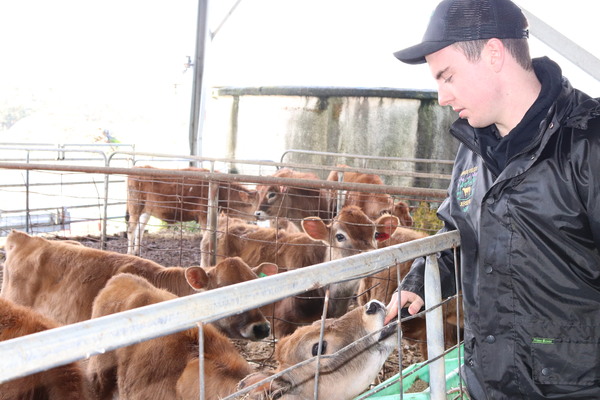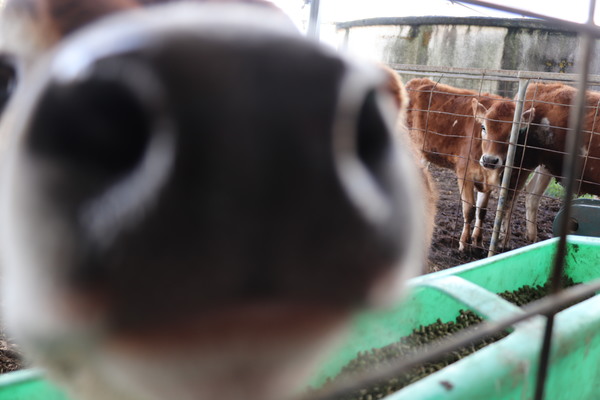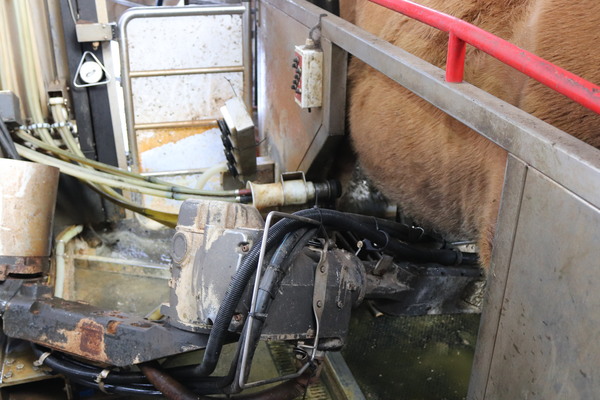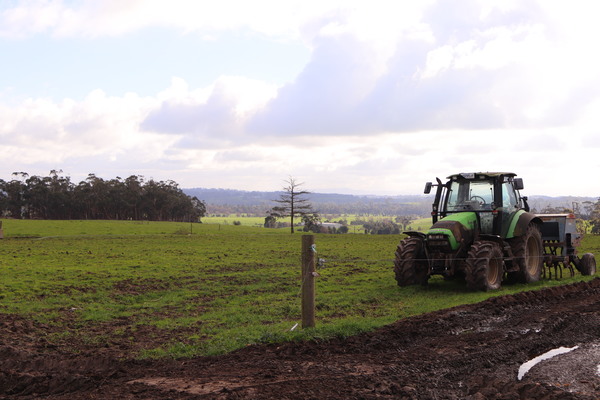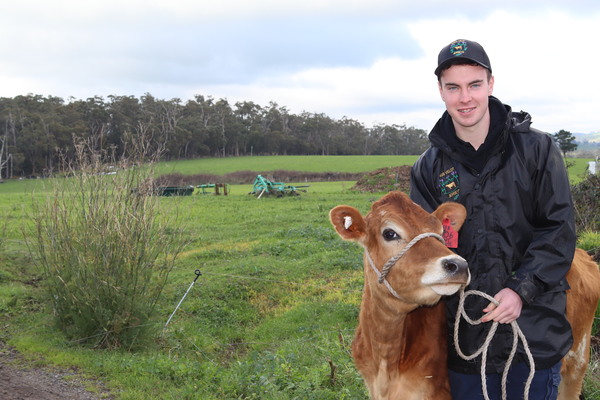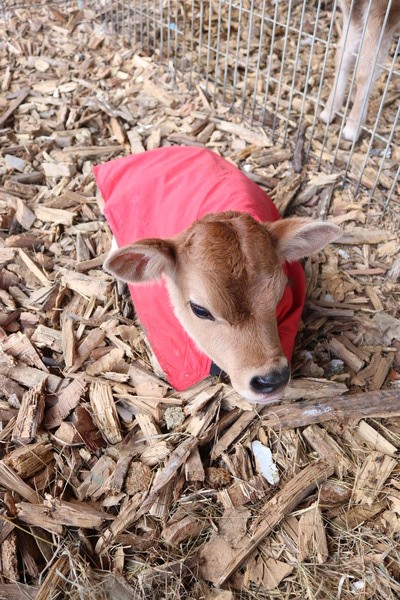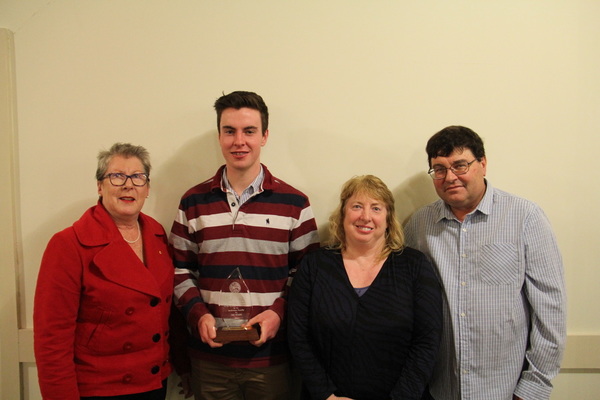
The Anderson family’s roots run deep in the south eastern region, stretching back more than a century. Originally a family of market gardeners before turning to dairy farming in the late 1800s, it seems the Andersons found their calling: they’ve won countless awards over the years for their dairy herds with many cows able to trace back their lines as far as their stud owners. Now, heir apparent Patrick Anderson carries on the legacy, as DANIELLE KUTCHEL reports.
“All our cows have names. We can trace them back 150 years.”
Sitting at the kitchen table, with views overlooking the 300 acre Anderson property in Athlone, 18-year-old Patrick Anderson is clearly proud of his heritage.
The sixth-generation dairy farmer points out a family tree listing his family, including ancestors and those still living, along with the names of their studs.
There are photos of some of the first cows that started the journey, and Patrick says he can trace their lineage as well as his own, down into his current herd.
“All our cows have names. We can trace them back 150 years. You know those cows, fed that calf, bred that cow, know her daughter, and know her son.”
Branching out from his mother and father, Patrick has even begun his own stud: Kings Veldt Jerseys.
With cattle so clearly in his blood, Patrick says it is easy to carry on with the family business.
“It’s the love for cows really that keeps us going. We’re more on the stud side than the commercial side and you really get to know those animals.
“It gives you a different passion, you’re not just out there slogging it out every day -you’re building your own genetics, building families and your reputation.
“When I got my own cows … that kind of repowered my passion for it, whereas other people get to 18, 19, and say showing cows is boring because all they do is lead it in the ring – they’re piggy-backing along on what their parents do, not following their own passion.”
Patrick has been heavily involved in the running of the family farm from an early age. His father, Lindsay Anderson, says neither Patrick nor his three sisters were ever pushed into it – rather they were “given the rope” and allowed to run with it.
Patrick helps run his parents’ stud, Kings Vista, as well as his own and makes a lot of the decisions: from selecting a new tractor to identifying new genetics to add into the herd and choosing which cows to show at events. While he juggles his year 12 studies his main job on the farm is feeding the calves.
He is also carrying on a proud family tradition of showing dairy cows, competing at the Berwick and Dandenong Shows. The Royal Melbourne Show and Warragul Fair may also be on the cards for this year, and he has already taken part in the Gippsland Dairy Show.
As well as showing cows, Patrick is also being called up to apply his knowledge as a judge – something that makes his father proud.
Earlier this year Patrick won the Victorian Agriculture Show’s state junior judging final – for the second year running. He will be travelling to Perth for the national junior judging finals later in the year and hopes to better last year’s third place win.
“Judging definitely is different, but even if you’re not the judge at a show you’re still judging everyone else’s animals. The only difference is it now centres on your decision,” Patrick explains.
“I do like the judging part because it comes down to the breeding side of it. You’ve got to know how to judge a cow to breed a cow.”
Last month, on behalf of his family, he accepted a plaque from the Berwick and District Agriculture and Horticulture Society, commemorating their 120 year contribution to showing dairy cattle.
Farming has changed a lot over the past 130 years, but the Andersons have weathered the challenges. From droughts to milk price clawbacks, Lindsay says he’s seen it all.
He admits the GFC had a big impact on them, though they weren’t hurt as much as other farms.
Luck is part of it, but Lindsay believes another reason why the family has stayed true to their heritage is because they have moved with the times.
“When we can, we’ve done advancements and updates. Others haven’t necessarily followed the research. You need to do your own to make sure you’re in a better position to know where to go.”
Hence, robots have now taken over milking at the Anderson farm – partly to reduce the risk inherent in human milking, and partly as modernisation catches up. The farm also gathers data on their cows daily to help run the farm more efficiently.
But, Lindsay acknowledges, farming is an unpredictable business.
“That’s part of dairy farming – you have to be flexible with it. You can never predict anything – even the weather people can’t say what will happen in 12 months’ time, and nor can we know what milk prices are going to be … so you have to keep your eye on that and have enough nous to know when to do what. It doesn’t mean all your decisions are 100 percent correct, but at the time they can be very correct.”
Climate change is at the back of his mind too, but Lindsay says that change is inevitable – the only question is how quickly it will happen.
“I think the best you can do is just farm for what you see coming,” he says.
“People are so quick to jump on farmers to blame them for climate change,” Patrick adds, “We’re getting more efficient and actually having less impact on the environment, but people believe it’s the farmers that are wrecking it.”
Then there are the well-publicised vegan-led protests against regional farms earlier in the year.
Both father and son say they too believe the videos shown by activists are bad.
“Even normal farmers baulk at them,” Patrick says.
“They show a minority. That’s like saying domestic violence happens in every single house. There’s no validity to what they’re trying to say because it’s not the industry as a whole.”
“There have been bad videos, videos we wouldn’t condone at all,” Lindsay adds, “but we look after our animals. We love our animals and we cry every time we lose one.”
The pair is cautiously optimistic about the future, as Lindsay hands more responsibility to his young son.
“We just hope he continues on. He’s sitting in a very nice position in that we’ll support whatever he wants to do. We’ll see what the future brings for him. It comes down to what the dairy industry ends up doing too.”
As for Patrick, there’s nothing he’d rather do.
“Always when you’re growing up you want to do this, you want to do that, but consistently for me it’s always come back to dairy farming.”

